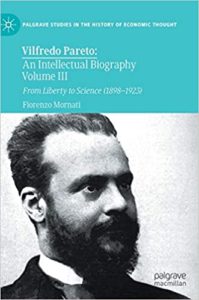In November 2018, I had the pleasure of having a LibertyMatters discussion on Vilfredo Pareto with Giandomenica Becchio, Rosolino Candela and Richard Wagner at the Online Library of Liberty. The title is “Liberty and Cynicism: Was Vilfredo Pareto a Liberal?”. In a sense, the discussion was about the quest for liberty and the pessimism for its success, a theme I fear is all the more cogent after Covid-19. In this regard, I recommend Rosolino Candela’s final article in the discussion.
Here’s a rather uplifting bit from Rosolino’s piece:
Regulators are precluded from an institutional context of private property, and therefore residual claimancy, over the profit opportunities they unintendedly generate, and the entrepreneurial incentive and economic knowledge embodied in such profit opportunities will therefore be absent to regulators. This explains the appeal to derivations by regulators to justify the existence of regulation based on the residues of its beneficiaries. Therefore, proponents of intervention can only acquire and identify knowledge that is available to them in the political setting. That is, they will be alert to political knowledge that is consistent with preserving their rents, lobbying for new interventions to correct for the failure to foresee the undesirable consequences of prior interventions, namely, consequences that threaten the benefits derived from regulation. (See Wagner 1989: 51–57.) This indeed characterizes the non-logical dynamics of the political processes.
Market processes “fail” to achieve perfection, and government processes fail to mimic perfection. The absolute size and scale of government may inevitably grow, as Pareto realistically predicted. But given that individuals are residual claimants of their decision-making, both correct and incorrect, in the market process, such robustness in the market process implies that there is scope for growth and development to “outrun” the expansion of government itself. Entrepreneurs not only profit from correcting errors introduced by other market participants, but more importantly, they also profit from circumventing regulations that stifle the market process, and therefore they erode the rents accrued through government privilege. The non-logical dynamics of rent-seeking and regulatory capture cannot exist without fueling a logical, entrepreneurial response in the market process to whittle down the benefits accrued from government intervention.
Pareto may have been politically realistic about the political process itself, but that doesn’t imply we should be cynical about the hope that markets can redeem us from the fate of socialism itself.
Three cheers for that!

Insofar as the discussion at large is concerned, I am sorry we did not have back then the second and third volumes (in English) of Fiorenzo Mornati’s excellent intellectual biography. Mornati’s work is an example of scholarship in the history of ideas and is a terrific aid in better understanding Pareto. In the third volume, Mornati stresses that what Pareto abandoned was less liberalism as such than “liberal political activism”. One of the great achievements of Mornati’s, in the first volume, is his account of Pareto’s experience as a businessman. That experience was really crucial for him to develop a realistic appreciation of Italian politics.
In many places in the discussion, we stressed Pareto’s quest to achieve a better understanding of the role of irrationality in human and political affairs. As Giandomenica Becchio pointed out, “The fundamental role of irrationality in humans as individuals as well as in social groups made Pareto skeptical about the success of liberal-democratic systems, which he thought were doomed to a fatal transformation as a consequence of human irrationalism.” During the last year, I have asked myself a number of times what Pareto would have made of the public debate in the time of Covid19- of our increasing inability to cope with the tragedy of death, the tendency to “medicalize” the public debate, the many attempts (at least, in Italy) to lay the blame for the epidemic on the allegedly reckless behavior of youngsters, the faith in increasingly bestowing public funds on society as a way to mend whatever social ills, including those the pandemic brought about, the need for “magical” solutions which feed the public debate, the new role of scientists in public policy making and the transformation of some of them in “influencers” with star power.
I cannot say what Pareto would have made of all of it, but I suspect it would not have made him more inclined to any optimism about the fate of liberalism.


READER COMMENTS
Thomas Lee Hutcheson
Apr 16 2021 at 6:36pm
I also wonder what he would have made of the problem of externalities or rather the (I would contend) secularly increasing importance of external costs as a percent of GDP which (I also contend) increasingly escape the scope of tort redress or Coasian negotiation between those who benefit from ad those who are harmed by externally imposed costs.
Comments are closed.